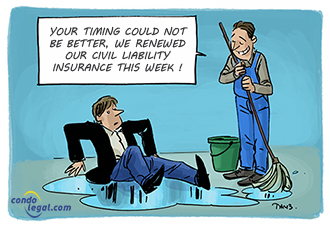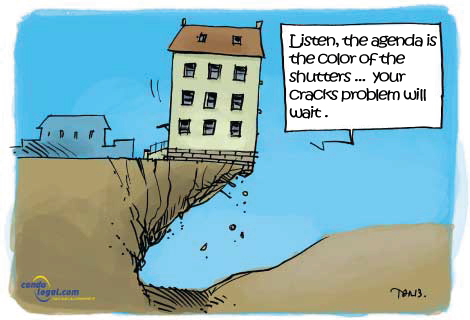 In the same way as any other natural or legal person, a syndicate of co-owners is likely to incur civil liability towards third parties, including co-owners. Responsibility is the counterpart of power: where authority lies, there is responsibility. A syndicate must therefore act with prudence and diligence, taking the necessary measures to prevent accidents normally foreseeable, ensuring that the common areas are safe and free of traps. Moreover, if his liability is engaged, this translates into the financial contribution of the co-owners, since in the event of a judgment condemning the syndicate to pay a sum of money, this sentence will be enforceable against him and the co-owners who were at the time when the cause of action arose. The latter could be ordered to pay part of this sentence, in proportion to the relative value of their fraction.
In the same way as any other natural or legal person, a syndicate of co-owners is likely to incur civil liability towards third parties, including co-owners. Responsibility is the counterpart of power: where authority lies, there is responsibility. A syndicate must therefore act with prudence and diligence, taking the necessary measures to prevent accidents normally foreseeable, ensuring that the common areas are safe and free of traps. Moreover, if his liability is engaged, this translates into the financial contribution of the co-owners, since in the event of a judgment condemning the syndicate to pay a sum of money, this sentence will be enforceable against him and the co-owners who were at the time when the cause of action arose. The latter could be ordered to pay part of this sentence, in proportion to the relative value of their fraction.
Special liability regime
Article 1077 of the Civil Code of Quebec provides that the syndicate is answerable for damages caused to co-owners or third parties in the occurrence (amongst others) of problems related to faulty design or construction defects of the immovable, or due to a lack of maintenance of the common portions of the co-ownership.
The syndicate may, however, be exonerated from such liability, if it can prove that the damage resulted from a fault of the victim, a case of superior force or the act of a third party. It should be remembered that in law, superior force is an unforeseeable and irresistible event whose effects cannot be prevented, even if all appropriate measures have been implemented. With respect to lack of maintenance, this provision does not create a presumption of fault against the syndicate. It assumes an obligation of means in this regard. The syndicate will thus be able to allege that it acted prudently, reasonably, and diligently. In other words, that it made adequate efforts to maintain the common elements.
The syndicate may thus have its civil liability invoked for damage caused by:
In the case of a construction defect in the common portions of the immovable, it is the duty of the syndicate to find and to hold responsible the parties liable for these disorders. A developer may be responsible, as well as the enterprises that have participated in the work and, in some instances, the professionals (such as, an engineer or architect).
Common liability regime
The syndicate's civil liability goes far beyond the scope of article 1077 of the Civil Code of Quebec. The syndicate may incur liability like any other natural or legal person. He may be held liable for his failure to comply with the commitments he has entered into (contractual civil liability) or the rules of conduct incumbent on him (extracontractual civil liability). In such circumstances, he is therefore bound to make reparation to the prejudice he has caused to others, whether bodily, material or moral. Damage may be punishable by damages and, in certain circumstances, punitive damages. The syndicate may also be held civilly liable for any misconduct by its employees, such as the manager, security personnel and janitors of the building. In this regard, article 1463 of the Civil Code of Quebec states: "The principal is bound to make reparation for injury caused by the fault of his agents and servants in the performance of their duties; nevertheless, he retains his remedies against them”. This would be the case, among others, in the event a janitor damages the vehicle of a co-owner.
The rules of civil liability provide, in order to obtain compensation, that it is necessary to be able to demonstrate the fault of the syndicate, the existence of damage, as well as a causal link between this fault and the resulting damage.
Liability insurance
To protect the syndicate of co-owners, it is mandatory for it to take out an insurance contract covering its liability to third parties. It represents a guarantee in the event of a loss involving the building (e.g. a poorly cleared and slippery staircase). The same applies to a loss caused by a person employed by the condominium (e.g. a janitor).
 WHAT YOU SHOULD KNOW! Generally, when the liability of the syndicate is invoked, the latter generally benefits from the support of its insurer under the civil liability insurance policy that it must subscribe under the law.
WHAT YOU SHOULD KNOW! Generally, when the liability of the syndicate is invoked, the latter generally benefits from the support of its insurer under the civil liability insurance policy that it must subscribe under the law.
 WHAT TO KEEP IN MIND: When the liability of the syndicate is invoked , the usual rules of liability come into play , which means that one must demonstrate the fault of the syndicate , a prejudice and a causal link between the fault and the resulting damage .
WHAT TO KEEP IN MIND: When the liability of the syndicate is invoked , the usual rules of liability come into play , which means that one must demonstrate the fault of the syndicate , a prejudice and a causal link between the fault and the resulting damage .
 WARNING! Failing taking the necessary measures to enforce the declaration of co-ownership, the syndicate can be held liable. However, it is an obligation of means, not of results. Therefore, if the syndicate has used all reasonable means to prevent a contravention, but with no deterrent effect, it will not theoretically be held liable.
WARNING! Failing taking the necessary measures to enforce the declaration of co-ownership, the syndicate can be held liable. However, it is an obligation of means, not of results. Therefore, if the syndicate has used all reasonable means to prevent a contravention, but with no deterrent effect, it will not theoretically be held liable.



